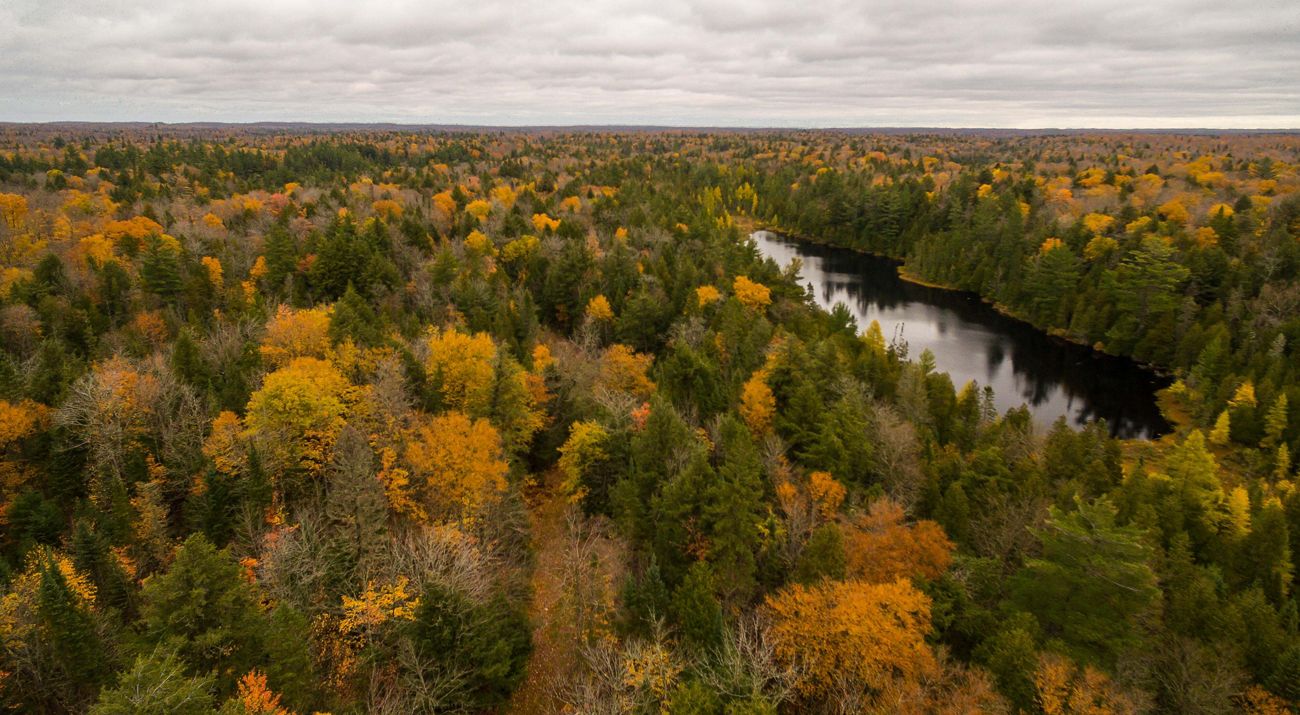First Carbon Credits for Michigamme Highlands Carbon Project Issued.
The Nature Conservancy Issued 211,000 credits for businesses to reduce carbon footprint, address climate change.

Media Contacts
-
Ryan Hermes
TNC
Phone: 517-999-7745
Email: ryan.hermes@tnc.org
LANSING — The Nature Conservancy (TNC) today announced the issuance of the first carbon credits from its Michigamme Highlands carbon project, a forest conservation project which spans 13,655 acres across a portion of TNC’s Wilderness Lakes Reserve and the Slate River Forest Reserve. The area, considered one of the most climate resilient in Michigan, was a working forest under previous ownership. TNC purchased the land specifically to assure better forest management and restoration to increase carbon sequestration, while continuing to manage the property as a working forest.
This issuance represents the first verified issuance from a project expected to yield approximately 860,000 credits over the 20-year crediting period. Credits are available to companies in Michigan, throughout the Midwest, across the country and around the world who wish to address their climate impact. The project is listed on the American Carbon Registry as ACR647.
“At The Nature Conservancy, we pride ourselves in our ability to advance nature-based solutions to counter the effects of climate change. Carbon markets that finance natural climate solutions help mitigate the impacts of greenhouse gas emissions,” said Helen Taylor, state director of The Nature Conservancy in Michigan. “We have worked diligently to ensure the Michigamme Highlands carbon project follows industry best practices for integrity and quality. We’d love to see Michigan corporations purchase these credits in their own backyard as part of their commitment to addressing climate change as well as protecting our northern forests in Michigan.”
These credit sales enable The Nature Conservancy to significantly increase the amount of Michigan’s forests we can protect and restore, returning those forests to renewable, resilient and productive sources of sustainably produced timber. This creates jobs for Michiganders who work in our forests and mills, ensures a lasting habitat for a wide range of wildlife, helps clean our water and air, and provides a place of solace and beauty we all can enjoy.
A portion of the funds raised from carbon sales will be directed towards climate resiliency and adaptation of underserved communities in southeast Michigan, through support for energy efficiency and home repair. This ensures income from climate solutions is reinvested where climate impacts are most felt.
Voluntary carbon markets allow difficult-to-decarbonize industries opportunity to offset their emissions immediately, while still taking steps to eliminate carbon emissions from their business operations.
Research conducted by the Forest Trends’ Ecosystem Marketplace found companies participating in carbon markets invest more and make more progress in reducing their own carbon pollution than businesses that don’t participate. Specifically, the study found companies that participate in the voluntary carbon market reduce their own emissions quicker than their peers and have clearer targets to address climate change.
“With the looming threats of rapid climate change and biodiversity loss, there is only so much time to address these existential threats to our way of life. It’s critical to use every tool at our disposal to create a world where people and nature can thrive,” Taylor said. “Offsetting emissions using high quality, verified carbon offset credits through voluntary carbon markets, like the Michigamme Highlands carbon project, present a great opportunity for businesses looking to do their part, offset their greenhouse gas emissions and provide valuable conservation benefits.”
The Michigamme Highlands project supports several of the United Nations Sustainable Development Goals (SDGs) including Good Health & Well-Being, Clean Water and Sanitation, Decent Work and Economic Growth, Climate Action and Life on Land.
The Michigamme Highlands carbon project aligns with the Integrity Council for the Voluntary Carbon Market’s 10 Core Carbon Principles, a global benchmark for high-integrity carbon credits that set rigorous thresholds on disclosure and sustainable development. By adhering to the requirements, this project ensures the credits issued are contributing to measurable, durable climate impact.
“By aligning our carbon projects to global benchmarks as well as our commitment to vetting potential corporate buyers who are committed to taking the necessary steps of reducing the direct and indirect climate impact of their operations, TNC is a leader in implementing and maintaining best practices in carbon credit programs to ensure their validity and consistency,” Taylor said. “We have been setting the standard for implementing carbon projects for more than 20 years and will continue to do so for decades to come.”
The Nature Conservancy is a global conservation organization dedicated to conserving the lands and waters on which all life depends. Guided by science, we create innovative, on-the-ground solutions to our world’s toughest challenges so that nature and people can thrive together. We are tackling climate change, conserving lands, waters and oceans at an unprecedented scale, providing food and water sustainably and helping make cities more resilient. The Nature Conservancy is working to make a lasting difference around the world in 83 countries and territories (39 by direct conservation impact and 44 through partners) through a collaborative approach that engages local communities, governments, the private sector, and other partners. To learn more, visit nature.org or follow @nature_press on X.